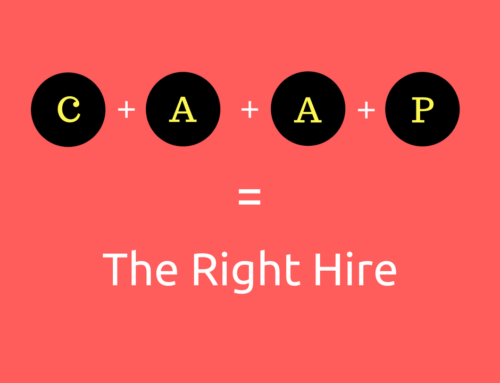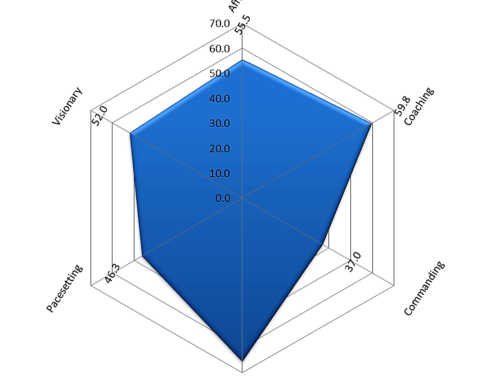Lately, I’ve been seeing some articles calling recruiters and hiring managers to hire for attitude but not for aptitude.
Honestly, I have been quite ruffled and disturbed by this strange trend of reasoning.
One article had the following statement: “Hire for attitude, not aptitude. Knowledge and skills are certainly important for making a long-term hire, but there’s also no discounting cultural fit. When deciding between the two, put personality first. You can train for skill. You can’t train for personality.???
Seriously, I’ve re-read the above statement countless number of times but I still don’t get what the author is trying to say. Is she talking about cultural fit? Or is she talking about personality? Or is she talking about attitude?
She’s saying “hire for attitude, not aptitude”. Does this mean you should hire someone who has good attitude but cannot learn?
Here’s one thing that is clear to me though: she’s confused. The author clearly has confused personality with attitude, and skills with aptitude.
So let me take this opportunity to put this right…
Personality and Attitude are two different things, and so are Skills and Aptitude. What are the differences?
In short, Culture, Attitude, Aptitude and Personality can be seen as four different attributes and they should not be taken together as one. Let’s take a look at each one of these attributes from the standpoint of the CAAP® High Performance Model.
In the interest of time, let us first take a look at Culture in this article. We’ll examine the rest of the other attributes in subsequent articles.
So what is Culture?
To put it simply, Culture refers to the way people think, work and interact with each other within an organization or within a team. Culture is the collective amalgamation of attitude, aptitudes, and personalities – both at the organizational level and at the team level. We must keep in mind that there are different levels of culture within an organization – for instance, organization-wide culture, department culture, team cultures.
These are generally known as “sub-cultures???. As long as you have a group of people come together to form a group or a clique, you have a Culture. In general terms, Culture is the accepted norms, behaviour and language that a group adopts.
It is important to select a candidate who is able to fit in with the prevailing culture of the organization and the team.Selecting a candidate with the incorrect cultural fit could potentially spell trouble for both the candidate and the organization or team.
Take for instance, the corporate culture at General Electric Co. (GE). GE is well-known for its intensely competitive culture. When Jack Welch was the CEO, he was known to have categorized the employees into three groups: the top 20%, the middle 70% and the bottom 10%. The bottom 10% is the result of a process known to some as “Forced Ranking???.
The top 20% is showered with praises and financial rewards. The middle 70% is given stretch goals and the bottom 10% will be purged from the organization. As a result of this practice of “bottom slicing???, it created an intensely competitive environment within GE.
The culture within GE at that time alludes to an extremely fast moving, dynamic and competitive internal environment. Therefore for a new hire to be successful or to even survive, the candidate needs to be able to fit in and adapt to this highly competitive GE environment.
Most hiring managers fail to consider the effect of sub-cultures within their organization. When you hire someone into your team, you need to consider both the organization-wide culture and the team culture, because both the cultures may differ slightly but at the same time overlap one another.
For a new hire to be able to survive and thrive in the organization and the team, the new hire needs to be able to adjust and adapt to both cultures at the team level and also at the organization level.
Assessing Organizational Culture
Most people have trouble articulating what Culture is, including many seasoned HR professionals. Most would end up describing Culture as the accepted norms, behaviours, language and symbols used within the group.
However there is a much more effective way of analyzing Culture. We can look at Culture from 10 different dimensions, however in the interest of time and space, I will just list 5 of these dimensions here:
- Degree of Structure (hierarchy)
- Degree of Autonomy (decision making)
- Urgency in Decision-making
- Speed of Innovation
- People-Task Orientation
These 5 dimensions are quite self-explanatory. They give us an easier way to examine and to better understand and articulate what Culture is. Take a look at your own organization and team cultures through the 5 dimensions above and you will get a much clearer picture and a better understanding of what the Culture in your own organization or team is all about.
As Claudio Fernandez-Araoz, senior advisor at leading executive search firm Egon Zehnder and regular lecturer at Harvard Business School puts it: “You must check for how well an incoming star will fit into your industry given its dynamics; your organization given its culture and strategy; and your team given the personalities on it.???
So don’t overlook Cultural Fit in your next hire.
We’ll examine Attitude in my next article.
Share this article with your friends and colleagues!
Learn how to hire the right people every time, avoid the mistakes most interviewers make, maximise employee engagement levels, lead and manage your employees to peak performance, minimise attrition rate, and so much more…
PLUS: Receive a free sample chapter on How to Craft Effective Interview Questions from my yet-to-be-released book How to Hire the Right People Every Time: The Executive’s Guide to Getting It Right
Get your weekly tips now. Join us here.








This exactly what I have been thinking all along. In the middle east I have been working for more than 18 years now and most hiring managers are talking the same thing and their selection criteria is attitude and for them aptitude is irrelevant than I am thinking why one has to go to professional colleges get trained on specific skills and specialize in certain areas if anyone with a great attitude can learn everything. This looks totally silly as hiring managers think skills can be thought or learned but attitude or personality cannot be developed, which is absolutely wrong, but the majority of the mindset of hiring managers are looking or focusing only on attitude irrespective of the aptitude of the candidate. I am happy I found someone who has joined my debate and thank you very much for taking up this topic of attitude, aptitude, personality and culture which many people around the world are confused and are giving their own flavor and this comes specially from the west and the rest try to follow even if it is not 100% right.
Hi Francisco,
Thank you very much for your comments. Yes, I absolutely agree with you that many have confused Attitude and Aptitude. It is important to know the difference between the two. Hiring managers have for a long time focused only on Attitude, however through my experience over the last 2 decades, I have learnt that Attitude is not Aptitude, and we need to differentiate between the two. You can hire someone with great Attitude but if this person has low aptitude to learn on the job, you will still have a problem on your hands.
I will be addressing each of these attributes over the next few weeks. Next week I will talk about ATTITUDE.
So please do check back here again next week for my next article/post.
And please continue to post your comments and insights so everyone can learn from you too!
Steven